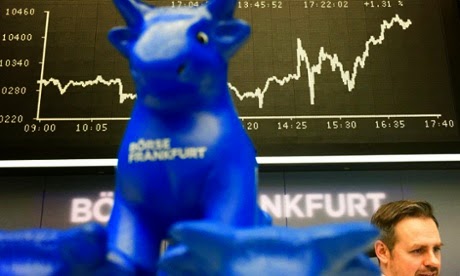The Guardian view
on QE in the eurozone: better late than never
(…) There are myriad theories about exactly
how QE works – from inspiring workers to demand a pay rise, to enticing
financiers to lend to companies instead of just governments – most of them
dubious. Many of the Fed’s freshly minted QE dollars have ended up swelling New York hedge funds, while the wand waved by the Bank of
England has worked more magic in the South Kensington
property market than anywhere else. But however perverse it may be to reward
the speculating classes who had such a hand in the original crisis, it is preferable
to sitting idly by while purchasing power shrivels away. Until , the record of
the ECB was worse than passivity – it has spent most of the past two years
contracting its balance sheet, and with it the real value of the money in
circulation. And as the US
and the UK
A powerful case can be made that it would
not only be fairer but more expansionary too if instead of embracing a
conventional QE programme, the ECB had been more creative – and lent straight
to expanding employers, directly bank-rolled investment in public
infrastructure, or simply credited cash into regular citizens’ accounts. Europe , however, is not in imaginative mood. It currently
needs all the energy it can muster just to survive. At least it showed on
Thursday that it is not in the grip of a death wish.
EDTORIAL / GUARDIAN / Thursday 22 January 2015 / http://www.theguardian.com/commentisfree/2015/jan/22/guardian-view-quantitative-easing-eurozone-better-late-never







Sem comentários:
Enviar um comentário